Like in my post A Bird’s Cage, there will be (explicit) spoilers from the Fate/Stay Night (+Unlimited Blade Works) series. If you haven’t seen any of the Fate/Stay Night series and would not like to get spoiled, I would recommend watching it soon (the newest adaptation by UFO Table, Unlimited Blade Work tv series is a great one). Without further ado, here is Unlimited Introspection Works: Ideals vs Reality.
I am the bone of my sword…
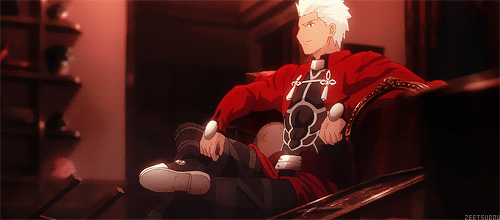 In the Fate/Stay Night visual novel, there are “routes” you take which will lead to different endings (one of them being Unlimited Blade Works). This particular route has many concepts juxtaposed against each other, however the prominent theme is an ideal vs reality. Throughout the series, you are introduced to several characters which two of whom we will mainly focus upon in this post: Emiya Shirou and the nameless hero servant, Archer.
In the Fate/Stay Night visual novel, there are “routes” you take which will lead to different endings (one of them being Unlimited Blade Works). This particular route has many concepts juxtaposed against each other, however the prominent theme is an ideal vs reality. Throughout the series, you are introduced to several characters which two of whom we will mainly focus upon in this post: Emiya Shirou and the nameless hero servant, Archer.
When Shirou was saved from the disaster the previous Holy Grail War had brought, he became traumatized and developed Survivor Syndrome (or simply Survivor’s Guilt) as a result. Growing up, Shirou had always wanted to be a Champion of Justice due to the influence of the one who saved his life, Emiya Kiritsugu. It was because Shirou felt the ideal was an admirable one that he was determined to follow his foster father’s footsteps and take on Kiritsugu’s dream. Consequently, Shirou employs an altruistic demeanor and shows a constant desire to help others without any reward. It was his way of being able to cope with the trauma he suffers and believed the simple act of helping others was, in fact, his own reward.
After suddenly being forced to participate in the Holy Grail War himself, Shirou finds the limits of his ideals being tested whenever he sees his servant Saber in combat. Despite having shown that she is marginally more powerful and skilled in combat than he is, Shirou constantly warns her of the dangers of combat and prefers to fight in her stead. His ideals are pushed even further in various ways depending on the route you choose, however he consistently remains determined to place priority on other people’s lives over his own.
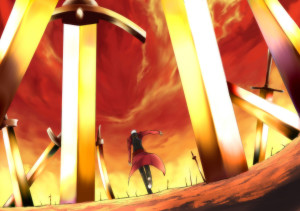 It is later discovered in this route that Archer’s true identity is Shirou from the future. A few years after the conclusion of the Holy Grail War he had participated in, Shirou began to work as a freelance magus in order to achieve his goal of becoming a Champion of Justice. Later in his life, he would come face to face with a calamity that had the power to wipe out a population. Due to this confrontation, Shirou decides to make a contract with the (entity known as the) World in order to gain powers beyond what he was originally capable of. However after having suffered many wars and being betrayed by his own ideals, Archer sought to go back and kill his past self hoping the time paradox would erase his existence.
It is later discovered in this route that Archer’s true identity is Shirou from the future. A few years after the conclusion of the Holy Grail War he had participated in, Shirou began to work as a freelance magus in order to achieve his goal of becoming a Champion of Justice. Later in his life, he would come face to face with a calamity that had the power to wipe out a population. Due to this confrontation, Shirou decides to make a contract with the (entity known as the) World in order to gain powers beyond what he was originally capable of. However after having suffered many wars and being betrayed by his own ideals, Archer sought to go back and kill his past self hoping the time paradox would erase his existence.
Archer views Shirou as a reminder of his mistakes and the sorrow that will inevitably come. Shirou sees Archer as an obstacle to overcome so that he may maintain his ideals and continue to push forward. This vast contrast between their values and beliefs naturally caused friction between the two which inevitably led them to fight. A literal battle of an ideal versus reality.
Steel is my body and fire my blood…
The conflict these two characters face has always been one humanity constantly debates over. It is still present even to this day. A clear example would be among the political parties of a country. It even goes as far beyond the BC era. Around 372 BC, there was one philosopher who tried to make sense of the conflict and offer his interpretation. This man was the one who declared “human nature is inherently good”; his name was Mencius.
This abridged phrase, however, hardly provides an accurate description on what Mencius had taught to his followers. According to the Internet Encyclopedia of Philosophy (IEP), Mencius’ attestment was that human kind “has a heart-mind which feels for others.” In essence, human kind is that of a compassionate one. Mencius goes further to describe traits humans supposedly naturally possess: benevolence, righteousness, wisdom, and propriety (with more focus towards the first two traits).
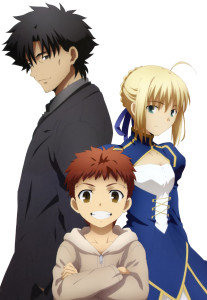 Benevolence is the desire to do good or to have good will. Righteousness is the “disposition to disdain or regard as shameful dishonorable behavior or demeaning treatment” (Stanford Encyclopedia of Philosophy). Wisdom is the knowledge and capability to understand these core fundamentals. Propriety is conforming to acceptable behavior. Mencius claims benevolence and righteousness have both cognitive and behavioral aspects to them. He also teaches that these four core virtues are “tendencies” every human has and refers to them as “sprouts”.
Benevolence is the desire to do good or to have good will. Righteousness is the “disposition to disdain or regard as shameful dishonorable behavior or demeaning treatment” (Stanford Encyclopedia of Philosophy). Wisdom is the knowledge and capability to understand these core fundamentals. Propriety is conforming to acceptable behavior. Mencius claims benevolence and righteousness have both cognitive and behavioral aspects to them. He also teaches that these four core virtues are “tendencies” every human has and refers to them as “sprouts”.
This metaphor implies while these virtues may be present, they are not developed. In order for these virtues to grow properly, Mencius states that everyone must “extend” or “fill out” in order to be fully virtuous. Mencius also mentions it is imperative to have proper mental activity for “full extension”. To clarify, Mencius states that one must be able to introspect in order to understand him or herself. Not only must one be able to reflect upon his or her actions, but one must also learn to understand why the actions are being done and what can be done to either remedy or improve upon them.
However, many of Mencius’ philosophy heavily relies on intuition. As such, there are many flaws in Mencius’ dogma. Everything the philosopher teaches is completely idealistic. He places numerous expectations onto people with the idea they can naturally grow to become “good”. The only realistic aspect to his doctrine is the fact people must nurture these apparent virtues so that it can grow.
I have created over a thousand blades…
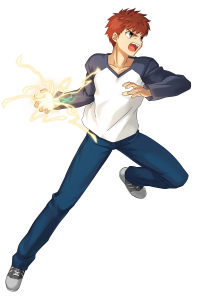 What Mencius taught to his pupils is similar to Shirou’s disposition. The difference however is Shirou’s idealism goes to an extreme; his ideals are that of a destructive one. As mentioned before, Shirou consistently acts as selflessly as he possibly can. He possesses the qualities of benevolence and righteousness to such an extreme, Shirou would (potentially) condemn even his family if they were not righteous in his eyes. While Confucius (whom Mencius was a follower of) would advocate the idea of placing priority on family first before others, Shirou would be the one to ignore that.
What Mencius taught to his pupils is similar to Shirou’s disposition. The difference however is Shirou’s idealism goes to an extreme; his ideals are that of a destructive one. As mentioned before, Shirou consistently acts as selflessly as he possibly can. He possesses the qualities of benevolence and righteousness to such an extreme, Shirou would (potentially) condemn even his family if they were not righteous in his eyes. While Confucius (whom Mencius was a follower of) would advocate the idea of placing priority on family first before others, Shirou would be the one to ignore that.
However we already know someone who has done exactly that: Emiya Kiritsugu. As some may recall from Fate/Zero, Kiritsugu murdered his father when he was a young boy. He had felt the death was justified due to the numerous casualties his father had indirectly effected. Kiritsugu’s murders do not end there. He ends up killing more people in order to keep the facade of “peace”. If the death of one will save the many, then he will take that chance. Towards the end of the series, the Holy Grail reveals to Kiritsugu the result of his idealism. It is only then he finally realizes the reality of his actions.
Ironically, Shirou will eventually find himself in the same position of his foster father as he moves forward. He will move on to “saving” people as much as he can until he is finally betrayed by his own ideals. This is how Archer became the way he is and why his hatred for himself had manifested. There were numerous times Archer had called Shirou’s ideal a hypocrisy. He explained that in order to become a champion of justice, one must indirectly wish for an evil. In an amusing twist, the Holy Grail War proved to be the perfect “evil” for Shirou to finally become the Champion of Justice he had yearned to become.
Unknown to death, nor known to life…
Mencius was not without rivals, however. Among the people who opposed Mencius’ view, there was one distinct philosopher by the name of Xun Zi who claimed instead that “human nature is inherently bad”.
Unlike Mencius, he did not believe that humans were inherently good, but instead, selfish in nature. Xun Zi asserts humans have a natural tendency to linger towards destruction and disorder. He also states that it is explicitly for that reason humans must learn to restrain and better themselves. To help combat against one’s selfish desires, Xun Zi often teaches “The Way” (or also known as Taoism). According to Xun Zi, “The Way” isn’t the way simply because heaven approves of it, but rather because it is good.
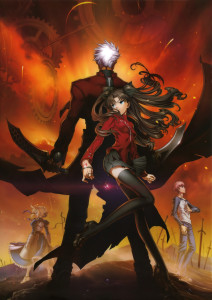 Similar to many other religions, Taoism is a blend of both religion and philosophy. Some practices lean more towards a religious stance whereas others are pure philosophy. What remains the same, however, is the core belief that Taoism shows “The Way” in order for people to enter heaven. It lays out principles for people to follow so that they may become civil people and help society grow without chaos. It is Xun Zi’s belief that without The Way and studying it, people will inevitably fall victim to their desires and do whatever it takes to satisfy it.
Similar to many other religions, Taoism is a blend of both religion and philosophy. Some practices lean more towards a religious stance whereas others are pure philosophy. What remains the same, however, is the core belief that Taoism shows “The Way” in order for people to enter heaven. It lays out principles for people to follow so that they may become civil people and help society grow without chaos. It is Xun Zi’s belief that without The Way and studying it, people will inevitably fall victim to their desires and do whatever it takes to satisfy it.
In many cultures, heaven has always been perceived to either be a godlike entity or simply a force without bias. Xun Zi proved to have a very rationalistic view on heaven. Rather than mythical place which possesses powers beyond our imagination, Xun Zi states that heaven is part of nature. He further explains that heaven is “just a destination” and does not get involved in human affairs. In essence, like nature, heaven does what it always has done and it is up to humans themselves to reach that destination.
Although Xun Zi believes humans have a tendency to lean towards “bad” things, he does not believe people are evil; Xun Zi does not believe people deliberately violate morals. Although Xun Zi may seem pessimistic regarding human nature, he’s actually optimistic about people being able to overcome their desires. The difference, however, is that Xun Zi is rather despondent about humans being able to make the first step to reform. To obtain order and peace, humans need to overcome their primal desires and walk along the path of “The Way”. A statue does not simply become a piece of art without the sculptor.
Have withstood pain to create many weapons…
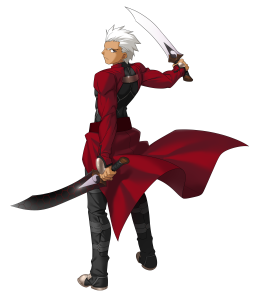 Archer, who opposes everything Shirou stands for, ties in to this quite interestingly. Not only is Archer the end result of Shirou’s ideals, he also represents the idea of two opposites.
Archer, who opposes everything Shirou stands for, ties in to this quite interestingly. Not only is Archer the end result of Shirou’s ideals, he also represents the idea of two opposites.
Before I dive into that, let’s focus on another character from the series: Saber (whose true identity is Arturia Pendragon). There was a particular scene in the Fate/Zero series where three kings sat down and had an interesting debate on what makes a good king. Arturia declared a true king is one who carries the will of all of his/her subjects. The other king, Rider (Alexander the Great) disagreed suggesting a king is only great because of his/her subjects.
Arturia’s Noble Phantasm, Excalibur, gathers the hopes and dreams of all great warrior’s from the past, present and future. The energy is then used to unleash it as one devastating blow. As such, Arturia proves to be an idealistic character herself. She truly believes a king must endure and shoulder all the burdens of her subjects. This mentality inevitably leads people to their own fall. Such is the result of an overly idealistic approach.
Then, is it really so surprising that both Kiritsugu and Shirou were able to call upon Arturia? Both of them, with their extreme ideals, summons a heroic spirit who is possibly just as equally idealistic as they are?
With that out of the way, let’s go back to Archer.
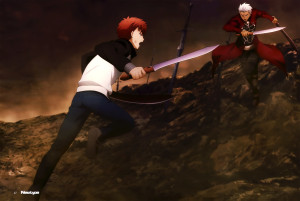 Interestingly enough, the attire and the weapons Archer possesses are all symbols of opposites. Despite being a servant himself, his apparel are tools which provide him the necessary assistance he requires. His overall color theme is black and red unlike Shirou’s servant, Saber, who has a color theme of blue and white. Archer’s weapon of choice also happens to be two swords with one being black and the other white (Kanshou and Bakuya). A fitting theme for a character whose role is to be the exact opposite of an ideal.
Interestingly enough, the attire and the weapons Archer possesses are all symbols of opposites. Despite being a servant himself, his apparel are tools which provide him the necessary assistance he requires. His overall color theme is black and red unlike Shirou’s servant, Saber, who has a color theme of blue and white. Archer’s weapon of choice also happens to be two swords with one being black and the other white (Kanshou and Bakuya). A fitting theme for a character whose role is to be the exact opposite of an ideal.
As someone who has gone through the horrors of reality, Archer goes out of his way maintaining a “realistic” stance. He also makes note whenever someone makes an idealistic suggestion and often retorts with sharp disagreement. Archer had even defected from Rin when she had told him of her plans of having Saber join back up with Shirou. Having been fed up with Rin’s unrealistic intentions, Archer betrays her to become allies with a different servant who had better odds of winning the Holy Grail War.
Having been betrayed of his own ideals time and time again, Archer has become cold and cynical. This sharp contrast to Shirou is what causes friction between the two. One believes his ideals are still desirable whereas the other calls him a hypocrite for believing it. Yet knowing all of this, even after hating what had happened to him, Archer still finds himself grasping his ideals. After all, they are what made him who he is.
Yet, those hands will never hold anything…
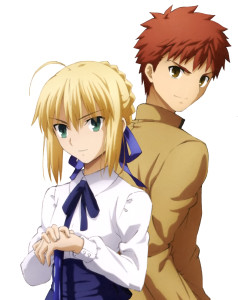 Back in my high school days, I had always admired Archer from the Deen adaptation of Fate/Stay Night. Interestingly enough, as I began to learn more about the dynamics between Archer and Shirou, I began to realize how oddly fitting it would be that I would like Archer.
Back in my high school days, I had always admired Archer from the Deen adaptation of Fate/Stay Night. Interestingly enough, as I began to learn more about the dynamics between Archer and Shirou, I began to realize how oddly fitting it would be that I would like Archer.
The concept of yin and yang has always popped up in my mind ever since I decided to take the handle “Balance” as my permanent online alias. Growing up, I’ve always struggled trying to figure out what I wanted to do and do it well. I’ve always been able to do things above average, but I was never an expert in anything. There were days where I felt anguished trying to understand what it is what I wanted to do.
After discovering that I was fairly proficient in Photoshop, I decided that I would go to the Art Institute to become a Graphic Designer. I initially was planning to go to Florida for that, however after one last call asking for ANOTHER loan, I declined the offer and stayed in my home state, Washington.
I ended up working right after high school and instead started taking online classes at the Art Institute. I had been taking those classes for a while until a few years later when I decided it would be a better experience to start taking classes on campus. Shortly after I had made the switch, I found myself completely disillusioned and disheartened at the amount of people who are actually talented. Having been confronted by this for less than a month, I decided to drop out. There were other factors that came into play, however the main reason why I had dropped out was that I realized that I clouded myself with the illusion that I was meant for art. What ended up happening was that I kept trying to go for an ideal without really thinking too much about it. Through that process, I began to understand myself a little better.
At least, I thought I was.
It’s quite ironic considering how difficult it is for one person to truly understand who they are. You see this theme every once in a while in some shows or games, however Persona 4 comes to mind when regarding facing one’s “shadow”. After finishing the game, I thought about what my own shadow would be and it was then that I came to a terrifying thought: What is my shadow?
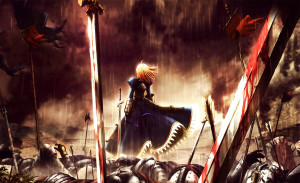 Back when I was in high school, I was very much like Shirou; I was very idealistic and felt all my actions were justified because I had thought I made logical decisions. Even after having dropped the idea of going to the Art Institute in Florida, I still pursued a career in Graphic Design. It would take years before I would eventually hit a wall. It wasn’t simply a wall to scale or overcome; this was the wall that was impossible, never-ending, unconquerable. Having faced that, I finally understood I had strayed from my path despite being told I was off to begin with.
Back when I was in high school, I was very much like Shirou; I was very idealistic and felt all my actions were justified because I had thought I made logical decisions. Even after having dropped the idea of going to the Art Institute in Florida, I still pursued a career in Graphic Design. It would take years before I would eventually hit a wall. It wasn’t simply a wall to scale or overcome; this was the wall that was impossible, never-ending, unconquerable. Having faced that, I finally understood I had strayed from my path despite being told I was off to begin with.
Now in the position I’m currently in, I work in a convenience store that I “own” (only by name; my father is the real owner). After having to work in this store every single day, I look back to the years that has passed since high school and I find myself regretting many things that I have done.
I regret not doing as much in high school. I regret trying to go for going for the Art Institute of Fort Lauderdale. I regret not double-checking my credits to see if I would be able to attend The University of Washington as backup. I regret sticking with the Art Institute of Pittsburgh Online Division. I regret constantly being conservative with myself. I regret so many things in life that I’ve lost count.
There was something my friend Nightmaren had said to me that had stuck with me for a long time. I can’t remember what it was in verbatim, however it went something along like this (very roughly paraphrased so forgive me, Nightmaren).
“I always found it silly for people to ‘not regret’ what they’ve done. In order to learn from the mistakes they’ve made, they have to make those regrets. It’s only then you will be able to move on forward with your life.”
-Nightmaren
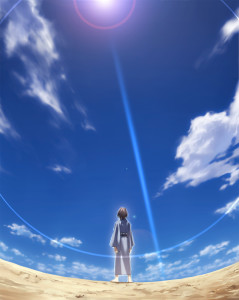 Now of course, there are people who say “I have no regrets” because they appreciate what they’ve learned and feel they’ve become a better person from it. Nevertheless I do have to agree with Nightmaren. If you haven’t regretted what you’ve done, then you will (in a way) find your actions justified just because it made you a better person. While that wouldn’t necessarily be the full thought process of those who say they “don’t have any regrets”, it is indicative of their nature.
Now of course, there are people who say “I have no regrets” because they appreciate what they’ve learned and feel they’ve become a better person from it. Nevertheless I do have to agree with Nightmaren. If you haven’t regretted what you’ve done, then you will (in a way) find your actions justified just because it made you a better person. While that wouldn’t necessarily be the full thought process of those who say they “don’t have any regrets”, it is indicative of their nature.
So now where does that leave me? Do I feel that my actions have inevitably made me wise? No, that’s not it at all. If anything, it frustrates me thinking of all the time that had been wasted. While you can always make the money again, you will never be able to get your time back.
Perhaps that is why I’ve become more drawn towards Archer in the more recent years. I’ve come to almost hate my past self. I’ve come to hate how my actions had caused me to lead such a mundane, banal life. I’ve come to hate how much time has flown by me and I’ve gained little to nothing from it. I’ve come to hate the decisions I made when I was a teenager.
Then, would that make me a realist? If so, then would that mean my shadow would be an idealist? Interestingly no. However I will have to leave that to another post.
So… as I pray…
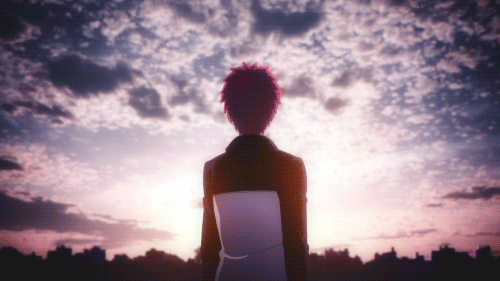 So then where does that leave me? Was I wrong to follow the path that I traversed? Am I right to think that I’ve become a better person after everything I’ve been through? Or should I cast off everything that I’ve done in the past and look forward?
So then where does that leave me? Was I wrong to follow the path that I traversed? Am I right to think that I’ve become a better person after everything I’ve been through? Or should I cast off everything that I’ve done in the past and look forward?
Archer never ended up killing his past self, but instead, helped Shirou. While it was never explicitly explained, I think he came to understand his efforts were futile. After all, it was his ideals that made him who he was. While he may regret what he’s done in the past and what followed thereafter, he’s learned that all he can do at this point is simply move forward. Despair often causes people to warp their mind set and come up with flawed logic. It’s difficult to stand back up on your feet when you’ve fallen down hard.
For the past two years since I’ve dropped out of the Art Institute, I’ve been struggling to stand back up. I ignorantly refused help on the facade that I knew myself better than anyone else. With the persistent help of my friends though, I finally managed to get back up. I can’t say I’m on both feet right now, but I’m at least standing up.
My body is made up of mistakes. My blood made up of regrets and my heart, shame. Nevertheless, I’ve gone through many ordeals. I’ve tried to go on forward without running away, but I never allowed myself to be understood. I was always alone, deluded into thinking I would become victorious in my ventures. In the end, I had thought my life would hold little meaning. Yet I’ve finally come to understand my loss and my gains. I will withstand the pain to go forward. I have my regrets, but they guide me on my path. My whole life has been and always will be…
Unlimited Introspection Works.
References
http://plato.stanford.edu/entries/mencius/
http://typemoon.wikia.com/wiki/Archer_(Fate/stay_night)
http://plato.stanford.edu/entries/xunzi/
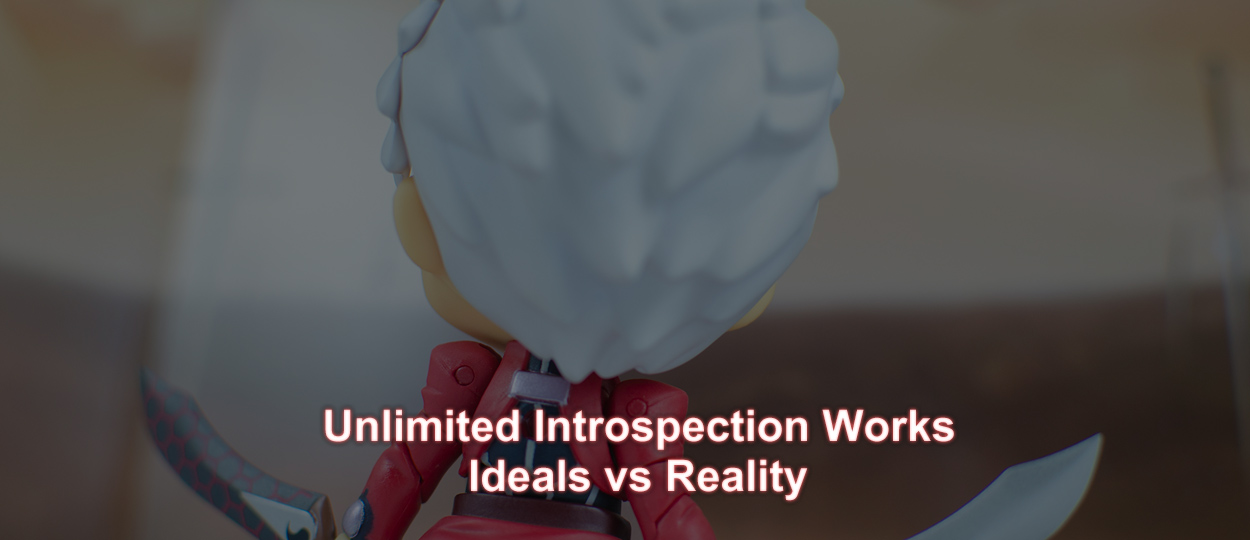
I will admit that I had a difficult time following this post with enough understanding to make an informed critical response. Part of it is due to the fact that I am wholly unfamiliar with Fate/Stay Night while another part no doubt deals with the vexatious nonspecific nature of philosophy. Due to my unfamiliarity with the series, I can do little more than agree with most of the tie-ins with the series, so I will instead focus more on the subject that I do know about: your person.
Though one thing I wish this article did was more thoroughly explore what criteria is actually needed for an ideal to be an ideal and a realistic concept to actually be realistic. These are questions in their own right, but I believe that if these were better explored, some of the early philosophers’ teachings would come across as less vague. Instead, many things here are arbitrarily classified as ideal or realistic.
But otherwise, you are very much correct about the balance that is required for these things. Either extreme is destructive.
One of the things I disagree with though is automatically equating “ideal” to “delusion”. If one is misguided into pursuing something they thought to be a good fit for them (such as your original pursuit of graphic design), is that still an ideal or is that their reality? Gray areas like this (which I would probably term “delusion” or “illusion” here) are why I felt that they could better be denoted by better defining “ideal” and “reality”. So no, while you were misguided in your original pursuits, I do not believe that to be on the same spectrum of ideal vs reality — I believe it to be a separate obstacle.
So then, do lessons from regrets, experience, and time enhance one’s realistic-ness or simply make such illusions fade to make things appear clearer? Is it better to pursue an imaginary ideal or limit one’s pursuit to realistic goals? At the end of the day, as you said, one can only introspect to decide these things for themselves, for the world is not an anime spectrum and there are many hidden alternatives to each and every mindset.
As I began to look back at my post while reading your comment, I find there were still a lot of things I definitely needed to improve on. I’ve always had the bad tendency to one, not provide a good definition of the subject I’m talking about and two, provide extremes as the only example.
I don’t think I did a proper job on elaborating either stance very well and you’ve made it pretty clear that I definitely need to go back and review what it is that I’ve written and retrace my thought process so it can be fixed. I do appreciate the time you took to at least read this article despite experiencing difficulty understanding the main material.
Perhaps that was something else I needed to do as I did not mean to place idealism as something destructive. You already found that I did mention a proper balance is needed between the two. I guess what I was missing was discussing the grey areas as they are often the ones that are more difficult to explain.
I did plan to explain the last bit you were talking about in a post further explaining that thought process, though perhaps that was a mistake on my part. I definitely need to learn how to write better and this really helps bring out points that I’ve forgotten to bring up and need to learn how to further elaborate. So thanks! I really appreciate it like I said again. I’ll remember this as I begin my next posts.